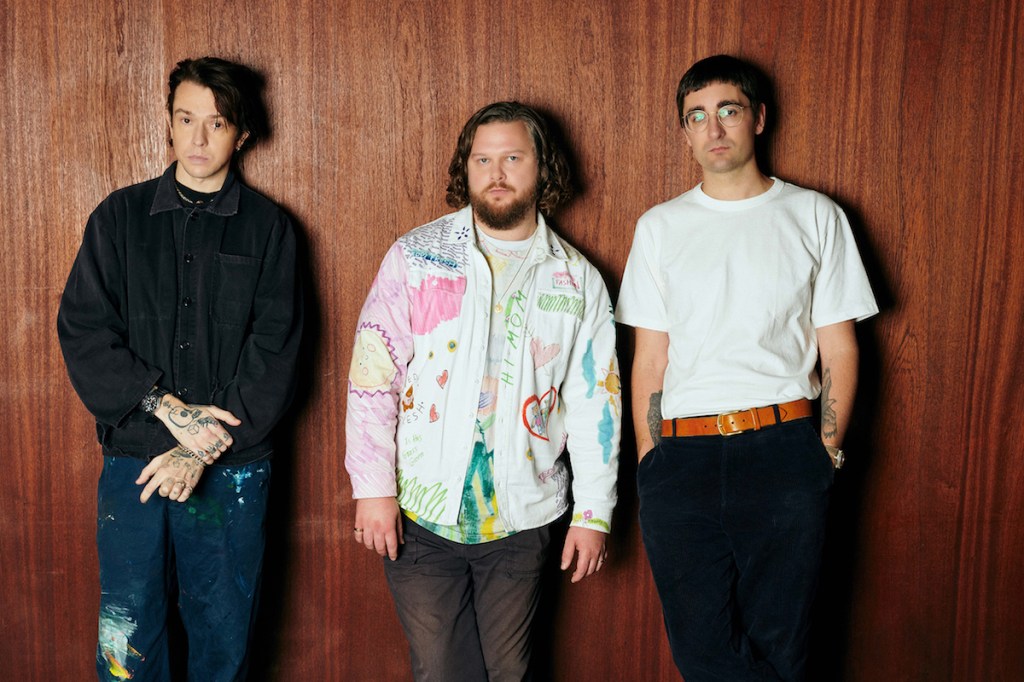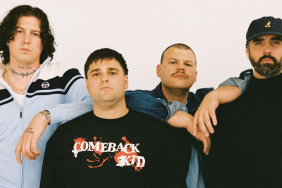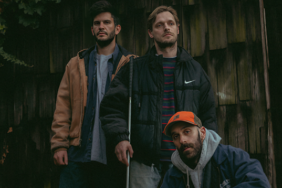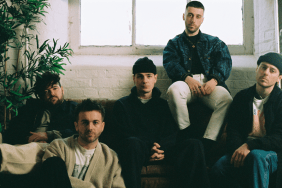No Australian can outdrink a member of Alt-J. Or so says Joe Newman. He may soon be called to put this statement to the test when Alt-J returns to Australia for The Dream 2022 Tour this September. (An event also celebrating the 10th anniversary of the English group’s debut album An Awesome Wave.)
Sitting beside Joe, bandmate Gus Unger-Hamilton appears to agree. He also breaks his silence on a longstanding love affair with the music of Pink Floyd. Both are certainly in good humour. For you see the two have very recently become fathers. The band’s full thoughts on parenthood, success and the recipe for a classic album, below.
MUSIC FEEDS: Firstly, congratulations on the release of your new album The Dream. Which is what? Two days old?
JOE NEWMAN: Yes, two days old.
MF: And just shy of 10 years since the release of your first album An Awesome Wave. Has it crossed your mind it has been that long?
GUS UNGER-HAMILTON: It seems like not a very long time at all. But it’s funny, isn’t it? I was thinking about this the other day because I feel sometimes like we put out albums quite infrequently. It has, on paper, been five years since the last album. But then I thought, “Four albums in 10 years? That’s not too bad!” Is it?
JN: One album out every two and a half years? I’d take that!
MF: Tell me about The Dream. How did this album come together?
JN: Well it comes together through cataloguing all of our work, our ideas, for the last 15 years. And then, more recently, writing new ideas. The thought of writing an album from scratch, I think people presume that that’s how it works in a band. I’m sure it does for some. But for us at least we draw from ideas that didn’t make it onto other albums. Or ideas that were on songs that we would never put on an album. And other things that just took us in the moment and we recorded and built them up.
You have things that you can draw from that are [points to head] above you. And then obviously there’ll be the buried ones, those scrolled away ideas, that you can dig up as well. And you’re still writing new music in that process too. So we’re pulling from three separate environments. It means that we’ve got a very well-rounded writing experience when it comes to working together in the studio.
MF: So it was a process of having a lot of ideas and whittling them down?
GU: We are quite economical when it comes to songwriting. There’s not a lot of dead weight. Not every idea ends up in a song. But once something goes past a certain phase, I feel like it’s probably going to go in a song. It’s pretty rare that a song is fully finished and is not released.
On this album, two songs were cut. But that was for really mundane reasons to do with vinyl production. It’s very hard to get vinyl pressed!
We were told the album had to be under 52 minutes. Which was a bit frustrating. But that discussion was such a long time ago I now feel like the album couldn’t really be any other way. It shouldn’t have been any other way. It was a good exercise to go through.
JN: And also, there have been occasions where we were quite self-referential. We do reference our previous ideas in other songs. And we do that because I think we have an eye on our discography as much as we do on the album and individual songs. We think about how to tighten our releases in reference to the other things we’ve released to date. So there’s this kind of nice journey that you can go on if you really want to go deep.
MF: How is the music of this album different from material from An Awesome Wave and other releases?
GU: I think that’s for listeners to decide really, you know? There’s no fundamental difference. I mean, okay, well, there actually was another band member on An Awesome Wave. There were four of us standing there. There have been three of us on the subsequent three albums.
You know, we’ve always kept our approach to making music broadly similar. Which is important. Joe here, my good friend sitting next to me, is the guardian of the band’s creative wellbeing.
JN: We work on songs together by finding a comfortable place to work. We enjoy jamming together. As we said before, we like working on fragments and putting them together into songs. And in terms of evolution? It’s always been an evolution and never really revolution with us. We’ve never fundamentally changed our sound. If we ever had a sound to start with.
We work as a collective. We always keep the same producer and we’re not outwardly looking for a change. I think we just grow organically. And like Gus said, we don’t know the music until we hear how the music has affected our fans. That’s the final sheen to the whole process I think.
MF: It is interesting you talk about guarding the flame of creativity. Many musicians struggle as a result of the competing demands of creativity and commerce. Is it challenging to keep Alt-J doing what it’s doing?
GU: I think it’s a sign of how fortunate we are that it’s not a pressing issue for us to question whether we can stay afloat as a business and work together as a band without getting other jobs. We have a loyal fan base and they, I think it’s fair to say, they don’t know what we’re going to release until we release it. And I think that mystery is the glue that ties us to, or protects us to, maybe staying employed.
But it is scary to hear of the sacrifices that people have recently turned to within the music industry. Like labels just dropping people in the pandemic because they have to slim down. Careers are ending overnight. And they’ll look back on it and be like, “Well, because of the pandemic, I lost the opportunity to write three albums with ‘X label’.” There are horror stories for sure in terms of like careers. But fortunately, it hasn’t happened to us yet. We just have to keep writing music. And that is probably what keeps us afloat, writing music.
MF: It is such an uncertain time to be a musician. How do you deal with uncertainty?
GU: Do you mean just in general, or in our own career?
MF: In life in general.
GU: It can be tough I think because we have a strange job where our success is not purely based on our work ethic. Or even necessarily on the quality of our work.
I think there’s also an indefinable kind of factor, which is popularity, pop trendiness and trends generally. And I suppose just the general capriciousness of public taste. Or even individual taste! I mean I’m as guilty of it as anybody. There have been bands whose albums I’ve genuinely adored and then they put out a new album and I’ve not listened to it. Like Clap Your Hands Say Yeah. Their first album I listened to hundreds of times. I’ve never listened to any of their other albums.
JN: Which is so weird. I mean I can’t even explain why I behave in that way. You know, I have listened to Pink Floyd for about 10 years and never mentioned it as an influence. I just had this realization today. There’s so much that you don’t talk about for whatever reason. But you are obsessed by it.
GU: I know. It’s weird. I suppose when it’s our band, I can sometimes almost take it quite personally. I’m like, “If you liked our first album so much why would you not want to buy the new album!?” I do the exact same thing myself!
How do you stay sane? I suppose, like Joe said before, it’s a bit of a cliché, but I suppose it’s actually just trying to remind yourself to be grateful. To not take for granted what we do for a living.
I mean, you know, I recently bumped into a guy who was in a band who were once at our level, or maybe even above our level for a couple of years around the time when An Awesome Wave came out. And I bumped into him the other day and he’s like, “The band’s broken up.” He’s now working as a tour manager. And I’m not saying he’s unhappy with that. But I was like, “Sh*t, you know like we’re still doing this as a band and we’re bloody lucky”.
JN: Yes. It’s like that. You went on one route, he walked on another. One person is still walking up that mountain and other people had to turn around for whatever reason. Some bands have a shorter lifeline. It’s bizarre.
GU: So I guess we’re still in an unbelievably enviable position as far as 99.9 per cent of the world is concerned.
MF: What is it that keeps people listening to an album after 10 years?
JN: I think it’s not necessarily about the music half the time. It’s about the experience that the person was having at the time. I had a friend that messaged me saying, “I’m listening to the first album it’s timeless!” For her, that first album maybe represented her first year of university or the date when she went travelling. It becomes the soundtrack to the thing that you look back on and think, “Oh, that’s when I was happiest.” Whether or not the music is good, it’s kind of irrelevant because it takes on a grander meaning I think.
I think innovation helps a lot as well. Like when I listen to The Beatles now I sort of think “I can’t believe this is 50 years old!” It feels almost more innovative, more than modern music is today sometimes. I think that could be part of it too, but then again, that doesn’t apply to all the music that stands the test of time. I think that’s just maybe an explanation for some music that stands the test of time.
MF: Both of you have become fathers very recently. Is that right?
JN: Yup.
GU: Yeah!
MF: Has that inspired you both as musicians?
GU: Yeah!
JN: You kind of lose your identity a bit when you have a baby. And that’s not a bad thing. But one of the coping mechanisms for me was that I started writing more music. It was about her. And that was really cathartic for me and comforting and a kind of a bonding experience (without actually having a bonding experience). I think having children changes you. And it’s just a wonderful experience.
GU: I think it also gives me a feeling of, “This is who I’m working for.” You know this is difficult because we’re about to go on tour. Next week we go to America for two months and that’s an awfully long time to be away from home. An awful long time. We’ve both got babies who are under one. A week is an eternity in their development. Sometimes even going out to work for the day, you come back and feel you’ve missed something or they’ve changed in that day.
JN: Yeah!
GU: You also think, well actually, it’s you I’m going out on tour for basically because I want to provide for you keep this roof over our head. So I suppose in, in another way it gives you a sort of professional purpose.
JN: Yup, yeah!
MF: You are coming to Australia very soon. What can fans expect to live?
JN: Well, we’ve been, we’ve been working on playing the songs live. We’ve spent, so we worked so hard at crafting the songs that it actually requires quite a lot of time to play them live. So our main focus is very simple. We learned the songs diligently so that we can play them just as the world expects to hear them.
GU: It’s so obvious but it has to be worth mentioning that the main focus of our tours is to make it sound as much like the original recording as possible.
We’re quite known for really great light shows. So we’re going to bring an amazing light show down to Australia. Which will be super cool. Hopefully, something that people have never seen before that’s going to really blow their minds.
Also as it’s the 10 year anniversary of An Awesome Wave. So we’re going to be, putting the majority of the album in our set as well. You know, we love playing those songs. We know that the fans love to hear them and that gives us huge energy when we play them.
Rehearsing ‘Matilda’ in a room to just our techs is not a very exciting experience. To play ‘Matilda’ to thousands of people who are singing every word back to you and got their arms around each other? That’s an experience like no other! I think once you are actually back out on the road you remember why you keep these songs in your set. You do it because of the response they get.
JN: Yeah.
MF: Is there anything else you want to share with your fans before we close off?
JN: Some of the proudest moments I’ve had were on our first trip to Australia because it was the furthest away from home I’d ever been. And we had fans there! It was a great signifier of just how far we’d reached. Then I got to know the Australian people. And I realised they’re just like us. Just a bit more chilled.
GU: I think Joe’s right. I think that back in 2012 when we first came to Australia, it was the most mind-blowing experience we’ve had so far in our career. And the extreme rapturousness of the reception to those two small gigs we did in Melbourne and Sydney, it was like nothing else. I think that was a proper kind of moment of, “Holy f**k! We are really on to something here.”
JN: Yeah it’s true.
GU: A lot of, “Our lives are never going to be the same again.”
JN: Yeah! You can’t out-drink us though! So that’s one thing actually.
MF: We shall see. I suppose we shall see.
–












